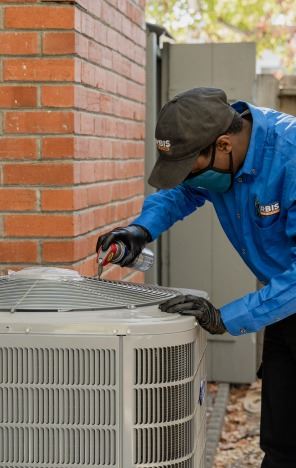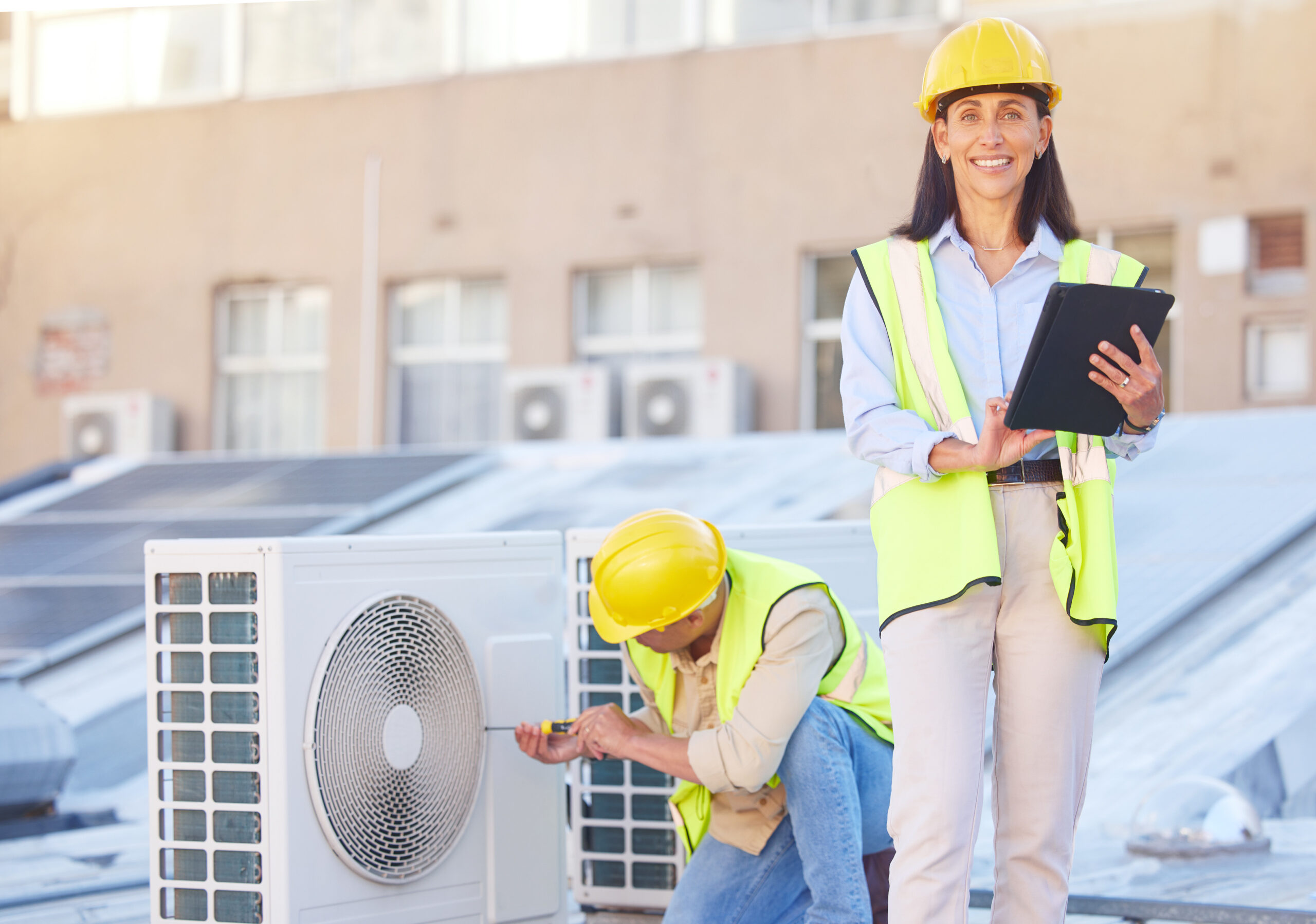Choosing In Between a Heatpump and Heater: Trick Considerations for Your HVAC Demands
When reviewing heating choices for cooling and heating requires, the choice between a warm pump and a heating system can be intricate. Each system uses distinctive advantages tailored to details environments and energy effectiveness goals. Understanding these differences is essential for making an enlightened option. Secret aspects such as installment prices and ecological effect better complicate the selection procedure. Which choice genuinely straightens with one's comfort and sustainability choices? The adhering to areas will certainly explore these considerations carefully.
Understanding Warmth Pumps: How They Function and Their Benefits
While lots of home owners think about various home heating options, recognizing how heatpump function and their advantages can substantially affect their decision. Warm pumps run by transferring warm as opposed to generating it. In the winter months, they extract warm from the outdoors air or ground and move it indoors, while in the summertime, they reverse this procedure, cooling the home by removing warmth outside. This dual functionality makes them flexible for year-round environment control.One of the key benefits of heat pumps is their energy effectiveness. They utilize significantly much less electricity contrasted to standard heating unit, possibly resulting in lower utility expenses (furnace replacement). Additionally, heatpump have a smaller sized carbon impact, making them an eco-friendly choice. They likewise need less maintenance than traditional systems, adding to long-lasting cost savings. In general, recognizing the technicians and advantages of warm pumps can assist house owners make educated choices concerning their home heating and cooling requirements
Checking Out Heating Systems: Types, Operation, and Advantages
Furnaces come in numerous kinds, consisting of gas, electric, and oil designs, each with distinct operational devices. Recognizing these distinctions is crucial, as they influence performance and heating performance. Furthermore, heating systems provide numerous advantages, such as constant heat outcome and dependability in chillier environments.
Kinds of Furnaces
Heater can differ significantly in design and procedure, with heating systems being a popular choice amongst property owners. There are several sorts of heating systems, each utilizing various fuel sources and innovations. Gas furnaces prevail, leveraging gas to generate warmth efficiently. Electric furnaces, on the various other hand, utilize electrical resistance to generate warmth, often preferred for their uncomplicated installation. Oil furnaces, while less typical, work in locations with restricted gas gain access to (heat pump service). Additionally, condensing heaters make the most of energy effectiveness by recycling and capturing exhaust gases. Each type runs via a system of warmth exchangers and ductwork to disperse cozy air throughout a home. Recognizing the differences in between these heater kinds is essential for notified a/c choices
Benefits of Heating systems
For home owners looking for dependable warmth throughout cool months, the benefits of heaters are significant. Heaters provide constant heating, ensuring even temperatures throughout the home. They are especially efficient in extreme cold, usually surpassing heatpump in cold conditions. Numerous kinds, including gas, electrical, and oil heaters, use flexibility to meet diverse requirements and preferences.Furnaces additionally tend to have reduced preliminary installment expenses compared to heatpump, making them an extra available option for several. Their robust design adds to a much longer life-span, with many units lasting over 15 years with correct maintenance. Furthermore, modern heating systems are typically furnished with sophisticated innovation for enhanced performance, which can cause lowered energy costs. Generally, furnaces continue to be a reputable option for reliable home heating.

Energy Effectiveness: Comparing Warmth Pumps and Furnaces
When comparing energy performance in between heatpump and heating systems, the Seasonal Energy Performance Proportion (SEER) plays an important role in establishing efficiency. Additionally, an operational cost evaluation discloses the long-term financial implications of each system. Comprehending these aspects can assist homeowners in making notified decisions concerning their heating remedies.
Seasonal Power Performance Ratio
Power effectiveness plays a crucial function in the decision-making procedure between heatpump and furnaces, specifically when thinking about the Seasonal Power Performance Proportion (SEER) This metric actions the cooling efficiency of warm pumps over a whole cooling season, giving a standard means to evaluate performance. Higher SEER scores show higher energy effectiveness, converting to reduced energy usage and lowered utility expenses. In comparison, heaters are normally examined utilizing the Annual Fuel Utilization Performance (AFUE) ranking, which shows heating efficiency. When contrasting these 2 systems, house owners must focus on SEER scores for warm pumps, as they directly influence general energy savings and ecological sustainability. A thorough understanding of SEER can especially affect the long-term satisfaction and cost-effectiveness of the picked a/c service.
Functional Expense Evaluation
Comprehending the operational prices associated with heatpump and heating systems is important for home owners examining their choices. Heatpump normally offer greater power performance, converting electrical energy right into heat with marginal waste. This leads to reduced monthly energy costs, particularly in modest climates. On the other hand, typical heating systems, specifically gas designs, might have lower in advance prices but can sustain greater functional expenses gradually as a result of fuel rates and efficiency ratings.Moreover, warm pumps can operate as both heating and cooling systems, possibly reducing the need for different HVAC systems. While first investments for warm pumps might be greater, their long-term financial savings in energy effectiveness can make them an extra cost-effective choice for lots of houses. Careful analysis of regional energy prices is vital to establish the most effective option.
Installation Expenses: What to Expect for every Heater
Installment prices for heating unit can differ substantially in between heat pumps and heaters, affecting property owners' decisions. Heatpump usually have greater ahead of time installment prices, commonly ranging from $3,500 to $8,000, depending on the unit dimension and intricacy of installment. This consists of the outside system, indoor handling system, and required ductwork modifications. Conversely, furnaces often tend to have reduced preliminary expenses, averaging between $2,500 and $6,000, which can be appealing for budget-conscious home owners. Nonetheless, installment costs can enhance if substantial ductwork is required.Moreover, the option of fuel kind for heaters-- all-natural gas, propane, or electrical-- can additionally influence setup costs. While heatpump supply power performance, their initial financial investment may deter some buyers. Eventually, reviewing setup costs along with long-lasting savings and effectiveness will aid home owners in making educated choices about their heating unit.
Climate Considerations: Which System Performs Much Better in Your Area
Exactly how do environment problems affect the efficiency of heating unit? The performance of heatpump and heaters can vary considerably depending on the regional climate. In moderate environments, heat pumps stand out by efficiently transferring warmth from the outside air, making them an energy-saving choice. Their efficiency reduces in exceptionally cold temperatures, where they might battle to extract sufficient warm. Conversely, heating systems, especially gas versions, provide trusted and consistent warmth no matter outdoor conditions, making them more effective in cooler regions.In locations that experience milder winters months, heat pumps can operate efficiently year-round, supplying both heating & cooling. In comparison, areas with rough winters frequently gain from the effectiveness of furnaces. Ultimately, understanding the local environment is essential when choosing in between a warmth pump and a heater, as it directly impacts their operational efficiency and total efficiency.
Upkeep Demands: Long-Term Look After Warmth Pumps vs. Furnaces
While both heat pumps and heating systems require normal upkeep to guarantee peak efficiency, their particular demands useful reference and treatment routines differ considerably. Heaters commonly require much less frequent focus, with annual inspections sufficing to examine for gas leakages, clean filters, and analyze total functionality. Their less complex style typically enables simple repairs.In comparison, heatpump require biannual upkeep due to their dual role in cooling and heating. This includes cleaning coils, checking cooling agent degrees, and ensuring that both the exterior and indoor units function at their ideal. In addition, heat pump upkeep often involves even more detailed elements, making specialist servicing essential.Neglecting upkeep can lead to diminished efficiency and increased energy expenses for both systems. Ultimately, property owners ought to take into consideration these lasting care needs when choosing in between a heatpump and a furnace, as proactive upkeep can prolong the life-span and performance of either system considerably.
Environmental Influence: Selecting a Lasting Heating Option
The environmental effect of home heating systems is a critical examination for house owners looking for sustainable options. Heat pumps are normally extra energy-efficient than typical furnaces, as they move warmth as opposed to produce it, significantly reducing carbon discharges. By using renewable resource sources, such as air-source or geothermal warm pumps, house owners can better reduce their eco-friendly footprint.On the various other hand, natural gas heaters emit greenhouse gases and add to air pollution, though they often offer higher heat outcome. Nonetheless, improvements in modern technology have caused the development of high-efficiency heaters that lessen emissions.Ultimately, picking a heating system entails weighing efficiency versus environmental effect. Property owners are urged to assess neighborhood power resources and motivations for sustainable systems, guaranteeing a selection that aligns with both personal convenience and ecological obligation. The decision impacts not only immediate convenience yet likewise long-lasting sustainability and environmental health and wellness.
Often Asked Inquiries
How Much Time Do Heat Pumps and Furnaces Usually Last?
The life expectancy of heatpump generally varies from 15 to 20 years, while heaters can last between 15 to thirty years. Normal upkeep substantially influences their long life and effectiveness in offering heating remedies.
Can I Utilize a Warmth Pump in Incredibly Cold Climates?
Warmth pumps can run in very chilly climates, yet their effectiveness decreases as temperature levels decrease. In such problems, supplementary heating resources might be necessary to keep comfortable interior temperature levels and assure peak performance.

What Is the Noise Level of Warmth Pumps Versus Furnaces?
The sound degrees of heatpump and heating systems differ significantly. Generally, heatpump run more silently than standard heating systems, making them more suitable for those conscious appear, while furnaces might produce louder operational noises throughout home heating cycles.
Are Heat Pumps Suitable for Both Heating & Cooling?
Heatpump are without a doubt appropriate for both heating & cooling (heat pump service). They operate by transferring warm, providing effective temperature control year-round, making them a functional option for home owners looking for an all-in-one HVAC option
What Size Furnace Do I Required for My Home?
Figuring out the ideal dimension home heating system for a home needs examining factors such as square footage, insulation high quality, neighborhood environment, and the home's design. Consulting click to read a professional can guarantee an accurate assessment and ideal convenience. Warmth pumps usually provide greater energy performance, converting electrical energy into warmth with minimal waste. In moderate climates, warmth pumps stand out by successfully transferring warm from the outside air, making them an energy-saving option. Conversely, heating systems, specifically gas models, offer trustworthy and consistent warm regardless of exterior problems, making them better in chillier regions.In areas that experience milder winters, heat pumps can operate efficiently year-round, giving both home heating and air conditioning. Warm pumps are typically much more energy-efficient than typical blog here heaters, as they move heat instead than generate it, considerably lowering carbon emissions. By using eco-friendly power resources, such as geothermal or air-source warmth pumps, house owners can better lessen their eco-friendly footprint.On the various other hand, natural gas furnaces produce greenhouse gases and contribute to air contamination, though they frequently offer greater warm output.